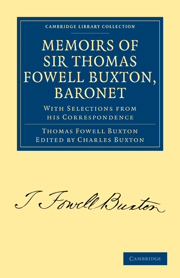Book contents
- Frontmatter
- PREFACE
- Contents
- CHAPTER I 1786–1802
- CHAPTER II 1802–1807
- CHAPTER III 1807–1812
- CHAPTER IV 1812–1816
- CHAPTER V 1816–1817
- CHAPTER VI 1818, 1819
- CHAPTER VII 1820, 1821
- CHAPTER VIII 1821–1823
- CHAPTER IX 1823–1826
- CHAPTER X 1822–1826
- CHAPTER XI 1826, 1827
- CHAPTER XII 1827, 1828
- CHAPTER XIII 1828, 1829
- CHAPTER XIV 1829
- CHAPTER XV 1829, 1830
- CHAPTER XVI 1830
- CHAPTER XVII 1831
- CHAPTER XVIII 1832
- CHAPTER XIX 1833
- CHAPTER XX 1833
- CHAPTER XXI 1833, 1834
- CHAPTER XXII 1834, 1835
- CHAPTER XXIII 1835, 1836
- CHAPTER XXIV 1836
- CHAPTER XXV 1837, 1838
- CHAPTER XXVI 1838
- CHAPTER XXVII 1838, 1839
- CHAPTER XXVIII 1839, 1840
- CHAPTER XXIX 1840
- CHAPTER XXX JUNE, 1840, TO APRIL, 1841
- CHAPTER XXXI 1841
- CHAPTER XXXII 1843, 1844
- CHAPTER XXXIII 1843, 1844, 1845
- RECOLLECTIONS OF SIR T. FOWELL BUXTON
- APPENDIX TO CHAP. XVII
CHAPTER XIV - 1829
Published online by Cambridge University Press: 05 July 2011
- Frontmatter
- PREFACE
- Contents
- CHAPTER I 1786–1802
- CHAPTER II 1802–1807
- CHAPTER III 1807–1812
- CHAPTER IV 1812–1816
- CHAPTER V 1816–1817
- CHAPTER VI 1818, 1819
- CHAPTER VII 1820, 1821
- CHAPTER VIII 1821–1823
- CHAPTER IX 1823–1826
- CHAPTER X 1822–1826
- CHAPTER XI 1826, 1827
- CHAPTER XII 1827, 1828
- CHAPTER XIII 1828, 1829
- CHAPTER XIV 1829
- CHAPTER XV 1829, 1830
- CHAPTER XVI 1830
- CHAPTER XVII 1831
- CHAPTER XVIII 1832
- CHAPTER XIX 1833
- CHAPTER XX 1833
- CHAPTER XXI 1833, 1834
- CHAPTER XXII 1834, 1835
- CHAPTER XXIII 1835, 1836
- CHAPTER XXIV 1836
- CHAPTER XXV 1837, 1838
- CHAPTER XXVI 1838
- CHAPTER XXVII 1838, 1839
- CHAPTER XXVIII 1839, 1840
- CHAPTER XXIX 1840
- CHAPTER XXX JUNE, 1840, TO APRIL, 1841
- CHAPTER XXXI 1841
- CHAPTER XXXII 1843, 1844
- CHAPTER XXXIII 1843, 1844, 1845
- RECOLLECTIONS OF SIR T. FOWELL BUXTON
- APPENDIX TO CHAP. XVII
Summary
During the session of 1829, Parliament was chiefly occupied by the discussions on the question of Catholic Emancipation. Mr. Buxton's constituents at Weymouth were opposed to the measure; and the knowledge of this opposition, combined with his own doubts, made him for a considerable time unwilling to vote at all on the question. With this neutrality, however, he could not long remain satisfied. After serious deliberation he became thoroughly convinced of the justice and expediency of the measure, and thenceforward gave it his support; a step which much offended many of his friends, and seriously endangered his seat for Weymouth.
To a Friend. “House of Commons, March 5.
“Here I am waiting for the Catholic debate, and you will be sorry to hear, — no, you will not, you are too valiant, — that I am going to secure my non-election next Parliament by voting for the Catholics to-night. I really must vote, the peace and safety of Ireland depend on our vote. I spent yesterday with Macaulay and Wilberforce very pleasantly. I am full of business, but not overworked; this is just what I like.”
On the 29th of March, he gives a kind of summary of the preceding twelve months.
“Wednesday next is my birthday, I shall then be forty-three. That day I have engaged to spend with my admirable friend Wilberforce, who, having devoted his life to the purpose of conferring upon Africa the greatest blessing which man can bestow on man, is now passing the remnant of his days in retirement and repose. […] ”
- Type
- Chapter
- Information
- Memoirs of Sir Thomas Fowell Buxton, BaronetWith Selections from his Correspondence, pp. 220 - 231Publisher: Cambridge University PressPrint publication year: 2010First published in: 1848

